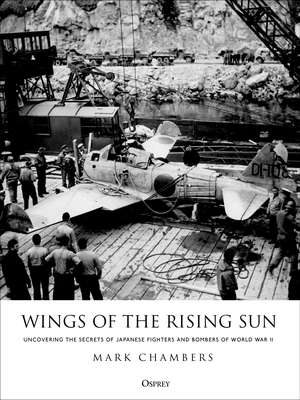Wings of the Rising Sun: Uncovering the Secrets of Japanese Fighters and Bombers of World War II
Autor Mark Chambersen Limba Engleză Hardback – 28 noi 2018
Preț: 168.67 lei
Preț vechi: 211.26 lei
-20% Nou
Puncte Express: 253
Preț estimativ în valută:
32.28€ • 33.78$ • 26.86£
32.28€ • 33.78$ • 26.86£
Carte disponibilă
Livrare economică 10-24 martie
Livrare express 21-27 februarie pentru 110.34 lei
Preluare comenzi: 021 569.72.76
Specificații
ISBN-13: 9781472823731
ISBN-10: 1472823737
Pagini: 336
Dimensiuni: 153 x 234 x 35 mm
Greutate: 1.32 kg
Editura: Bloomsbury Publishing
Colecția Osprey Publishing
Locul publicării:London, United Kingdom
ISBN-10: 1472823737
Pagini: 336
Dimensiuni: 153 x 234 x 35 mm
Greutate: 1.32 kg
Editura: Bloomsbury Publishing
Colecția Osprey Publishing
Locul publicării:London, United Kingdom
Caracteristici
Mark Chambers has considerable experience in writing historical aviation books for numerous publishers including Arcadia Publishing, Specialty Press, The History Press UK, High-Tide Publications, and The National Aeronautics and Space Administration (NASA).
Notă biografică
Mark Chambers is an avid World War II aviation enthusiast and aviation history author. He has studied World War II military aviation extensively, with a keen focus on the air war in the Pacific. He is the author of Images of Aviation - Flight Research at NASA Langley Research Center (2007), Images of Aviation - Naval Air Station Patuxent River (2014), Building the Supermarine Spitfire - Speed in the Skies (2016), Engineering Test Pilot - The Exceptional Career of John P. "Jack" Reeder (2007) and From Research to Relevance - Significant Achievements in Aeronautical Research at NASA Langley, 1917-2002 (2002). He works as a government contractor technical editor for the NASA Langley Research Center in Hampton, Virginia.
Cuprins
Chapter 1The Allied Technical Air Intelligence Units (TAIU)- The establishment of TAIU and their bases. Chapter 2Flight Testing and Evaluating Captured Japanese World War 2 Fighters- Flight Testing and Evaluating Koga's Zero-sen- Flight Testing and Evaluation at NAS San Diego, California- Flight Testing and Evaluation at NAS Anacostia, Washington, D.C.- Wind-Tunnel Testing and Ground Static Evaluation at NACA Langley, Hampton, Virginia- Flight Testing and Evaluation at Wright Field, Dayton, Ohio- Allied TAIU South East Asia and RAF/USAAF Evaluations- TAIU for the South West Pacific Area (TAIU-SWPA) and US Navy/USAAF Evaluations- TAIC Evaluations Chapter 3Flight Testing and Evaluating Captured Japanese Bombers- TAIU Southwest Asia - RAF/USAAF Evaluations- TAIU for the SWPA - US Navy/USAAF Evaluations- TAIC Evaluations Chapter 4Flight Testing and Evaluating Captured Japanese Seaplanes and Flying Boats- TAIU Southwest Asia - RAF/USAAF Evaluations- TAIU for the SWPA - US Navy/USAAF Evaluations- TAIC Evaluations Chapter 5 Flight Testing and Evaluating Captured Japanese Transports- TAIU Southweast Asia - RAF/USAAF Evaluations- TAIU for the SWPA - US Navy/USAAF Evaluations- TAIC Evaluations Chapter 6Flight Testing and Evaluating Captured Japanese Turbojet and Rocket-Powered Aircraft- TAIU Southweast Asia - RAF/USAAF Evaluations- TAIU for the SWPA - US Navy/USAAF Evaluations- TAIC Evaluations- US Army/US Navy findings at Japanese aircraft manufacturing facilities and military bases Chapter 7Evaluating Japanese Special Weapons- TAIU Southweast Asia - RAF/USAAF Evaluations- TAIU for the SWPA - US Navy/USAAF Evaluations- TAIC Evaluations- Survey of US Intelligence Report findings Chapter 8What the Allies Gained from Evaluations of Captured Japanese Aircraft - Determination of strengths and weaknesses of Japanese aircraft and aerial weapons- Enabled Allies to develop tactics for combating and defeating Japanese aerial threats- Provided invaluable insight into Japanese aircraft and aerial weapon design philosophy and manufacturing practices- Provided a valuable status of the state of Japanese aeronautics technology development and advancement during World War 2 Chapter 9 Where are they Now?- Japanese aircraft scrapped in US when no longer needed- Paul Garber (Smithsonian) stored many examples- Refurbished Japanese aircraft that were once US flight-test subjects- Refurbished Japanese aircraft that were once Allied flight-test subjects on display in Great Britain Appendices- Roster of Japanese captured test aircraft in the United States and abroad, with disposition where known - List of key American reports and evaluations of Japanese aircraft and aerial weapons technologies.Index
